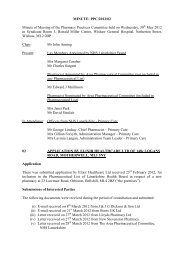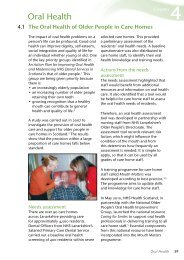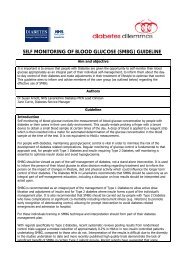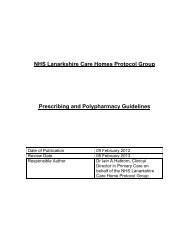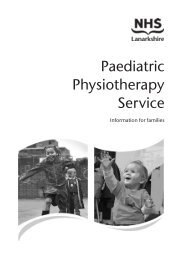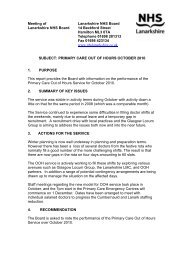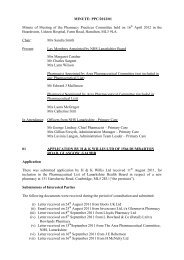Palliative Care Guidelines - NHS Lanarkshire
Palliative Care Guidelines - NHS Lanarkshire
Palliative Care Guidelines - NHS Lanarkshire
- No tags were found...
Create successful ePaper yourself
Turn your PDF publications into a flip-book with our unique Google optimized e-Paper software.
<strong>Palliative</strong> <strong>Care</strong> <strong>Guidelines</strong>: Emergencies in <strong>Palliative</strong> <strong>Care</strong>Hypercalcaemia in <strong>Palliative</strong> <strong>Care</strong>Introduction• Hypercalcaemia is the commonest life-threatening metabolic disorder in cancer patients.• Occurs most frequently in myeloma, and in breast, renal, lung and thyroid cancer.• 20% of patients with hypercalcaemia do not have bone metastases.• Common symptoms: malaise, thirst, nausea, constipation, polyuria, delirium.• Treatment may not be appropriate in a dying patient at the end of life – seek advice.• To reduce risk of renal toxicity from bisphosphonate treatment, consider withholdingmedication that affects renal function (eg. NSAIDs, diuretics, ACE inhibitors).Patient presents with symptoms suggestive of hypercalcaemia.Check calcium + urea & electrolytes, eGFR, albuminCorrected calcium ∗ Corrected calcium ∗ Corrected calcium> 4.0mmol/L 2.6 - 4.0mmol/L normal ∗Severe hypercalcaemiacan cause seizures Rehydrate with 1-3litres 0.9% NaCl IV Monitor calcium ifor arrhythmias - seek -check calcium, U & E next morning patient at risk ofconsultant advicehypercalcaemia.Calcium is still raised – treat with pamidronate IV (reduce dose in renal impairment)♦Corrected calcium (mmol/L) Pamidronate dose Diluent & maximum infusion rate2.6 – 3.0 30mg 500mls NaCl 0.9% over > 60 minutes3.0 – 3.5 60mg 500mls NaCl 0.9% over > 60 minutes3.5 – 4.0 90mg 500mls NaCl 0.9% over > 90 minutes> 4.0 90mg 500mls NaCl 0.9% over > 90 minutesIf calcium >3.0mmol/l, some units routinely give pamidronate 90mg as a higher dose mayincrease response and delay relapse.Review treatment ofunderlying cancer.Continue IV fluids until patient ableto maintain oral hydration.Calcium has Monitor renal function. Calcium normalincreased frompre-treatment levelafter rehydrationRecheck calcium after 5 days.and pamidronate.Maintain good hydration;recheck calcium after 2-3Seek advice; review Calcium has decreased from days. Do not repeatdiagnosis and pre-treatment level but is pamidronate until 7 daystreatment plan. still elevated. after first dose to avoidcausing hypocalcaemia.♦ Pamidronate in renal impairment: seek advice• GFR >20ml/min: give pamidronate over at least 90 minutes. ∗ Corrected calcium =• GFR




